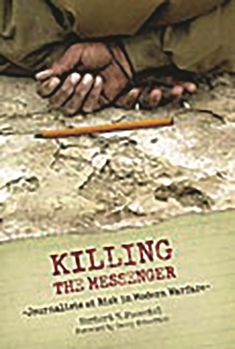Killing the Messenger: Journalists at Risk in Modern Warfare
Killing the Messenger reveals the dangerous new face of war and journalism. Covering armed conflicts has always been dangerous business, but in the past, press heroes like Ernie Pyle and Edward R. Murrow faced only the danger of random bullets or bombs. Today's war correspondent is actually in the cross hairs, a target of combatants on all sides of conflicts. In their own words, correspondents describe the new dangers they face and attempt...
Format:Hardcover
Language:English
ISBN:0275987868
ISBN13:9780275987862
Release Date:March 2006
Publisher:Praeger
Length:176 Pages
Weight:1.00 lbs.
Dimensions:0.8" x 6.3" x 9.6"
Customer Reviews
1 rating
Excellent. Thorough.
Published by Thriftbooks.com User , 18 years ago
When a Japanese sniper killed legendary journalist Ernie Pyle during World War Two, it was largely incidental and accidental when reporters died while covering warfare. In today's world, however, reporters are often the selected targets of political and religious terrorists seeking to maximize the reach of their message and the impact of their actions. In Killing the Messenger: Journalists at Risk in Modern Warfare, Herbert Foerstel examines why the practice of covering war has changed over time, becoming arguably more dangerous for reporters. War itself has, since World War Two, changed from conflicts between established nations to violent squabbles--often ethnic or religious in nature--between disorganized armed factions in remote regions of third-world countries or revolutionary uprisings against the governments of those nations. Foerstel interviews reporters who have been kidnapped, tortured or seen their fellow journalists--both American and foreign-- killed while doing their jobs. Those he interviews tell of how the strategic political entanglements of their native nations can make it difficult for reporters to be trusted by their suspicious sources, especially in Middle Eastern conflicts, where, in many minds, "America" equals "Israel," which, to many Muslims, is the political and religious equivalent of Satan. Kidnapped Chicago Tribune correspondent Phillip Caputo, for instance, tells of how it was almost a fatal mistake to carry two old Israeli business cards into Lebanon while covering the fedayeen in 1973. On the other side, sources tell of Israeli and American soldiers "accidentally" destroying equipment or killing correspondents seen as purveyors of propaganda. Foerstel discusses reasons why journalists have gone from enjoying "hands off" status--as they had during the Viet Nam war--to being prized targets. Not listed among the reasons are that they are symbols of "freedom," as some would have us believe. The reasons in reality are, sadly, much more cynical. First, reporters have monetary value. Kidnappers believe they can bargain for ransom with the media outlets for whom the journalists work and, indeed, have been paid handsomely in the past for the safe return of reporters. Next is publicity. Kidnappers know that reporters suddenly disappearing make world headlines and that any political message attached thereto gets broadcast and rebroadcast. Another reason news gathering has become more dangerous is the loss of objectivity. Reporters in the west have, especially since 9/11, felt compelled to take sides in global conflicts, echoing the "civilization versus terror" party lines of the Bush and Blair regimes. This has not gone unnoticed in the Middle East where the pro-West advocacy is seen by many as an anti-Islamic hostility. Finally, there is the dangerous and arguably stupid practice of intelligence agencies around the world using press credentials as cover for its operatives. The execution of journalists can be the only expec






